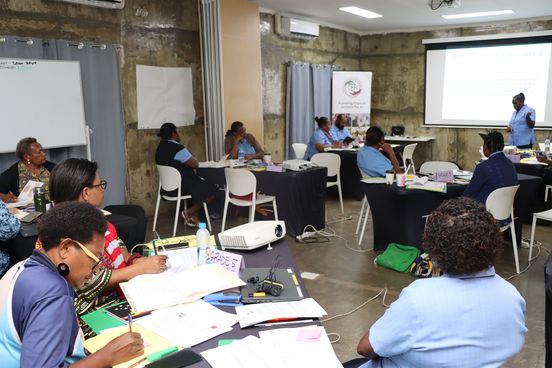The Department of Education (DOE) is prioritizing financial education within the national curriculum to help students across Papua New Guinea (PNG) become financially responsible adults.
In a step toward this goal, 25 primary school teachers, DOE Curriculum Development Division (CDD) officers, and officers from the Centre of Excellence in Financial Inclusion (CEFI) are attending a two-week Financial Education Workshop being held in the Central Province, aimed at developing essential resources for Prep to Grade 6 students.
The workshop, officially opened on October 21st by DOE First Assistant Secretary for Curriculum, Steven Tandale, will produce Teacher Resource and Student Activity Books that introduce financial topics like budgeting, savings, debt management, and investments.
Supported and funded by CEFI, the workshop’s setting at Tuhava Resort, allows participants, who come from a diverse educational background, to engage in content writing and discussions to create practical, easy-to-understand materials for classroom use.
To ensure alignment with the national syllabus, financial education topics will be integrated with existing subjects across grade levels—Culture and Community for early grades (prep-Grade 2), Social Science for Grades 3-5, Making a Living for Grades 6-8, and Business Studies for Grades 9-12.
A follow-up workshop is planned later this year to develop resources for Grades 7-12, covering advanced topics such as investment, superannuation and retirement planning.
The workshop aims to produce 14 educational resources, including Teacher Resource and Student Activity Books, to support financial education from Prep to Grade 6.
This initiative aligns with several national priorities, including Vision 2050, which promotes financial literacy, and the PNG Strategic Development Plan 2030, focused on inclusive education.
Additionally, it supports the National Education Plan, Financial Sector Development Strategy, and National Financial Inclusion Policy, all advocating for a financially literate society through an inclusive curriculum.
Since 2021, following a Memorandum of Understanding (MoU) Mr. Tandale acknowledged that while plans for developing financial education curriculum had been discussed for years, significant progress has been made since the partnership with CEFI began.
CEFI Executive Director, Saliya Ranasinghe, praised DOE’s commitment to this mandatory initiative, emphasizing the importance of financial literacy from a young age.
CEFI Deputy Director, Peter Samuel called on participants to “drive positive change” that will impact the future generation.
The workshop concludes on November 1st.

